Differences between Financial Accounts and Management Accounts
VerifiedAdded on 2023/01/11
|7
|1350
|71
AI Summary
This study explores the differences between financial accounts and management accounts, including their relevance to various users of financial information. It discusses the purposes and characteristics of both types of accounts and how they are used by managers, shareholders, prospective investors, suppliers, government, and employees. The study emphasizes the importance of preparing financial and management accounts to enhance organizational performance and build trust among stakeholders.
Contribute Materials
Your contribution can guide someone’s learning journey. Share your
documents today.
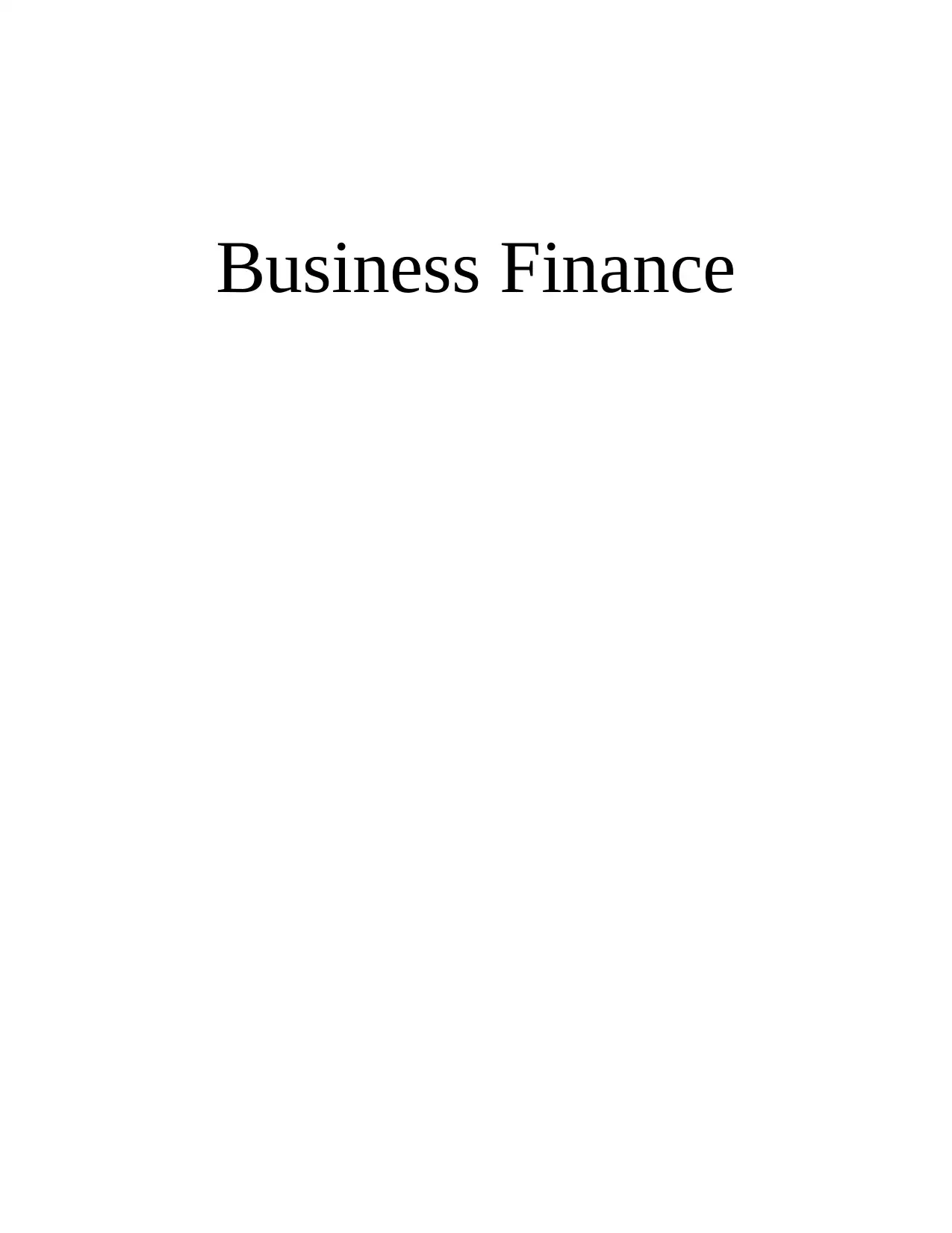
Business Finance
Secure Best Marks with AI Grader
Need help grading? Try our AI Grader for instant feedback on your assignments.
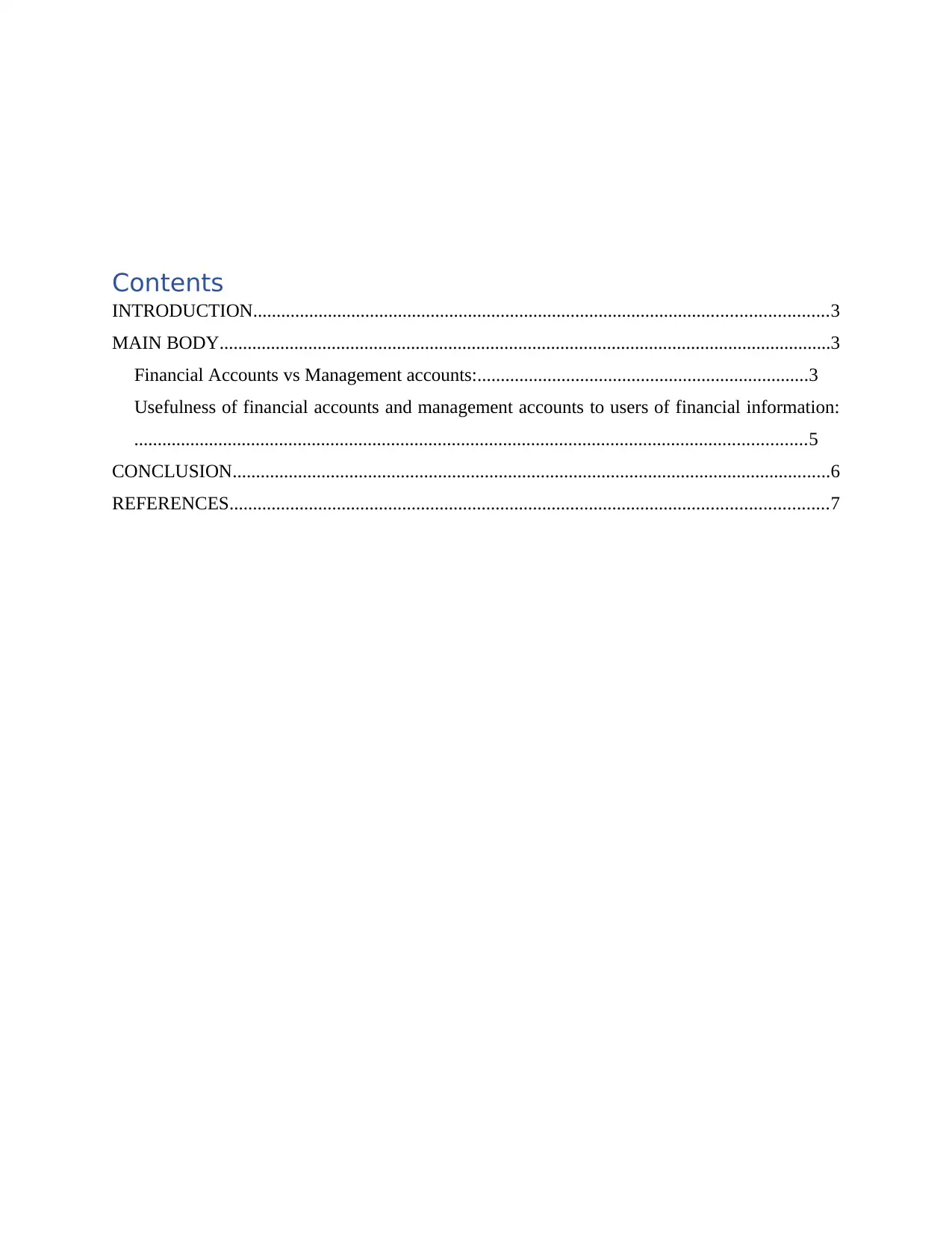
Contents
INTRODUCTION...........................................................................................................................3
MAIN BODY...................................................................................................................................3
Financial Accounts vs Management accounts:.......................................................................3
Usefulness of financial accounts and management accounts to users of financial information:
................................................................................................................................................5
CONCLUSION................................................................................................................................6
REFERENCES................................................................................................................................7
INTRODUCTION...........................................................................................................................3
MAIN BODY...................................................................................................................................3
Financial Accounts vs Management accounts:.......................................................................3
Usefulness of financial accounts and management accounts to users of financial information:
................................................................................................................................................5
CONCLUSION................................................................................................................................6
REFERENCES................................................................................................................................7
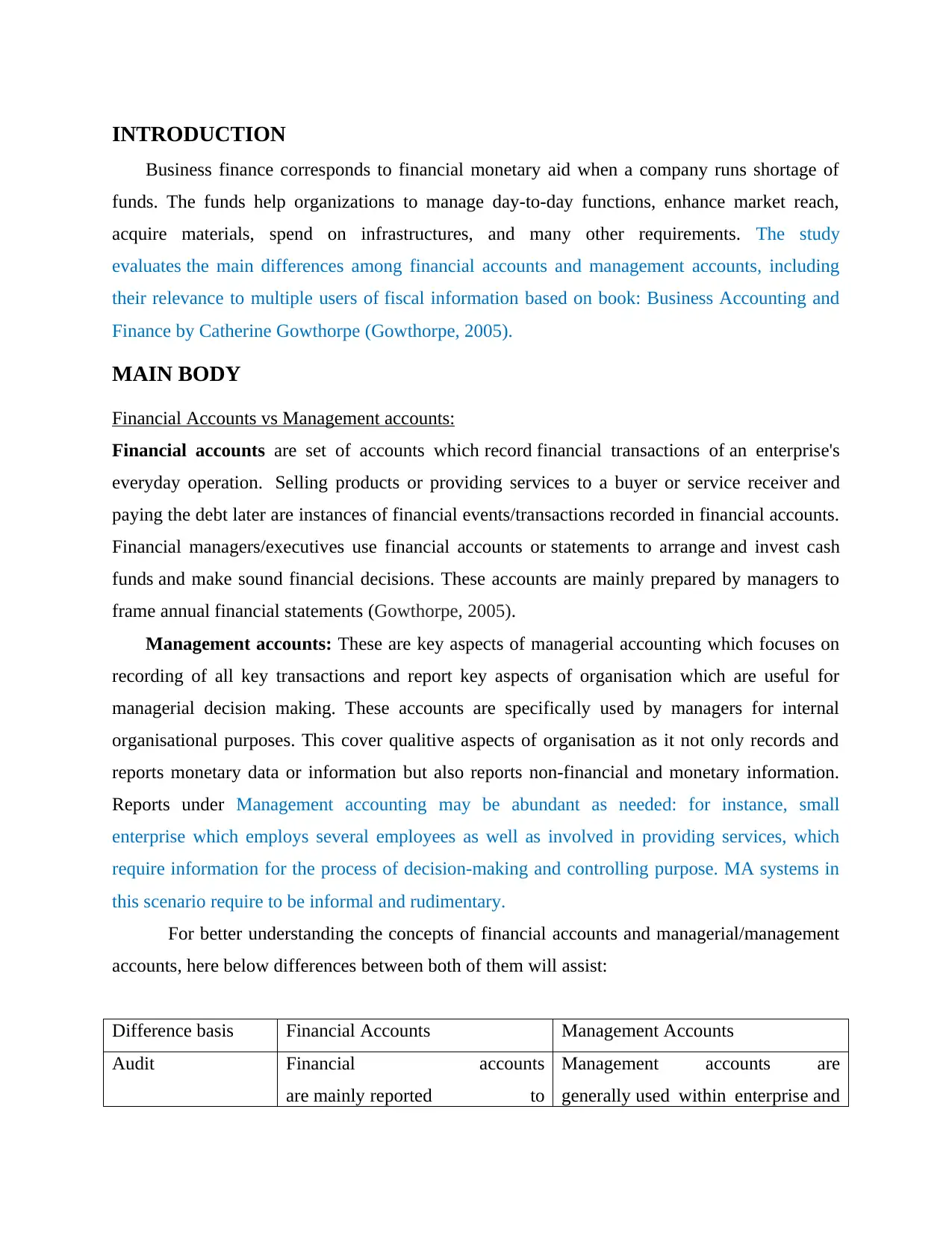
INTRODUCTION
Business finance corresponds to financial monetary aid when a company runs shortage of
funds. The funds help organizations to manage day-to-day functions, enhance market reach,
acquire materials, spend on infrastructures, and many other requirements. The study
evaluates the main differences among financial accounts and management accounts, including
their relevance to multiple users of fiscal information based on book: Business Accounting and
Finance by Catherine Gowthorpe (Gowthorpe, 2005).
MAIN BODY
Financial Accounts vs Management accounts:
Financial accounts are set of accounts which record financial transactions of an enterprise's
everyday operation. Selling products or providing services to a buyer or service receiver and
paying the debt later are instances of financial events/transactions recorded in financial accounts.
Financial managers/executives use financial accounts or statements to arrange and invest cash
funds and make sound financial decisions. These accounts are mainly prepared by managers to
frame annual financial statements (Gowthorpe, 2005).
Management accounts: These are key aspects of managerial accounting which focuses on
recording of all key transactions and report key aspects of organisation which are useful for
managerial decision making. These accounts are specifically used by managers for internal
organisational purposes. This cover qualitive aspects of organisation as it not only records and
reports monetary data or information but also reports non-financial and monetary information.
Reports under Management accounting may be abundant as needed: for instance, small
enterprise which employs several employees as well as involved in providing services, which
require information for the process of decision-making and controlling purpose. MA systems in
this scenario require to be informal and rudimentary.
For better understanding the concepts of financial accounts and managerial/management
accounts, here below differences between both of them will assist:
Difference basis Financial Accounts Management Accounts
Audit Financial accounts
are mainly reported to
Management accounts are
generally used within enterprise and
Business finance corresponds to financial monetary aid when a company runs shortage of
funds. The funds help organizations to manage day-to-day functions, enhance market reach,
acquire materials, spend on infrastructures, and many other requirements. The study
evaluates the main differences among financial accounts and management accounts, including
their relevance to multiple users of fiscal information based on book: Business Accounting and
Finance by Catherine Gowthorpe (Gowthorpe, 2005).
MAIN BODY
Financial Accounts vs Management accounts:
Financial accounts are set of accounts which record financial transactions of an enterprise's
everyday operation. Selling products or providing services to a buyer or service receiver and
paying the debt later are instances of financial events/transactions recorded in financial accounts.
Financial managers/executives use financial accounts or statements to arrange and invest cash
funds and make sound financial decisions. These accounts are mainly prepared by managers to
frame annual financial statements (Gowthorpe, 2005).
Management accounts: These are key aspects of managerial accounting which focuses on
recording of all key transactions and report key aspects of organisation which are useful for
managerial decision making. These accounts are specifically used by managers for internal
organisational purposes. This cover qualitive aspects of organisation as it not only records and
reports monetary data or information but also reports non-financial and monetary information.
Reports under Management accounting may be abundant as needed: for instance, small
enterprise which employs several employees as well as involved in providing services, which
require information for the process of decision-making and controlling purpose. MA systems in
this scenario require to be informal and rudimentary.
For better understanding the concepts of financial accounts and managerial/management
accounts, here below differences between both of them will assist:
Difference basis Financial Accounts Management Accounts
Audit Financial accounts
are mainly reported to
Management accounts are
generally used within enterprise and
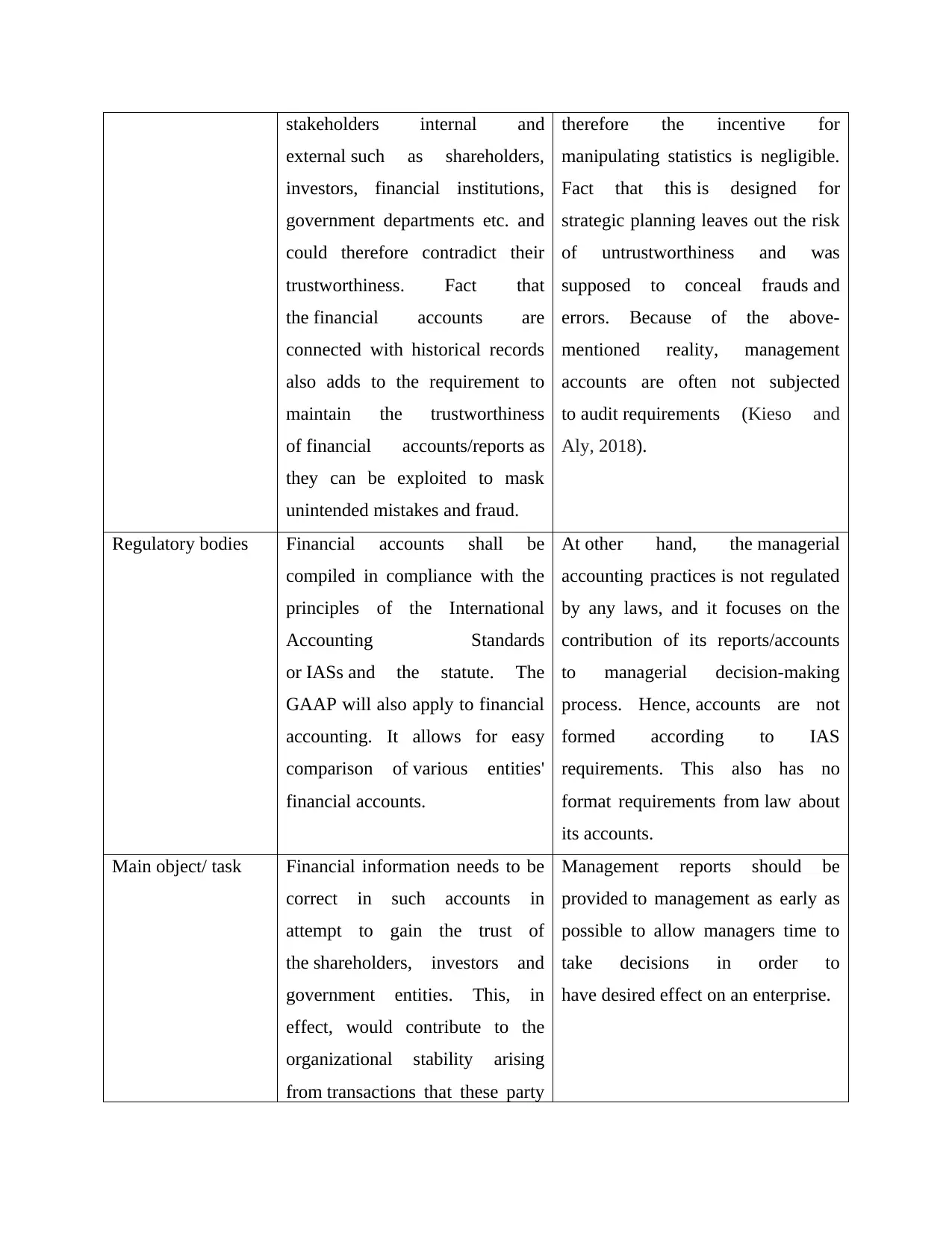
stakeholders internal and
external such as shareholders,
investors, financial institutions,
government departments etc. and
could therefore contradict their
trustworthiness. Fact that
the financial accounts are
connected with historical records
also adds to the requirement to
maintain the trustworthiness
of financial accounts/reports as
they can be exploited to mask
unintended mistakes and fraud.
therefore the incentive for
manipulating statistics is negligible.
Fact that this is designed for
strategic planning leaves out the risk
of untrustworthiness and was
supposed to conceal frauds and
errors. Because of the above-
mentioned reality, management
accounts are often not subjected
to audit requirements (Kieso and
Aly, 2018).
Regulatory bodies Financial accounts shall be
compiled in compliance with the
principles of the International
Accounting Standards
or IASs and the statute. The
GAAP will also apply to financial
accounting. It allows for easy
comparison of various entities'
financial accounts.
At other hand, the managerial
accounting practices is not regulated
by any laws, and it focuses on the
contribution of its reports/accounts
to managerial decision-making
process. Hence, accounts are not
formed according to IAS
requirements. This also has no
format requirements from law about
its accounts.
Main object/ task Financial information needs to be
correct in such accounts in
attempt to gain the trust of
the shareholders, investors and
government entities. This, in
effect, would contribute to the
organizational stability arising
from transactions that these party
Management reports should be
provided to management as early as
possible to allow managers time to
take decisions in order to
have desired effect on an enterprise.
external such as shareholders,
investors, financial institutions,
government departments etc. and
could therefore contradict their
trustworthiness. Fact that
the financial accounts are
connected with historical records
also adds to the requirement to
maintain the trustworthiness
of financial accounts/reports as
they can be exploited to mask
unintended mistakes and fraud.
therefore the incentive for
manipulating statistics is negligible.
Fact that this is designed for
strategic planning leaves out the risk
of untrustworthiness and was
supposed to conceal frauds and
errors. Because of the above-
mentioned reality, management
accounts are often not subjected
to audit requirements (Kieso and
Aly, 2018).
Regulatory bodies Financial accounts shall be
compiled in compliance with the
principles of the International
Accounting Standards
or IASs and the statute. The
GAAP will also apply to financial
accounting. It allows for easy
comparison of various entities'
financial accounts.
At other hand, the managerial
accounting practices is not regulated
by any laws, and it focuses on the
contribution of its reports/accounts
to managerial decision-making
process. Hence, accounts are not
formed according to IAS
requirements. This also has no
format requirements from law about
its accounts.
Main object/ task Financial information needs to be
correct in such accounts in
attempt to gain the trust of
the shareholders, investors and
government entities. This, in
effect, would contribute to the
organizational stability arising
from transactions that these party
Management reports should be
provided to management as early as
possible to allow managers time to
take decisions in order to
have desired effect on an enterprise.
Secure Best Marks with AI Grader
Need help grading? Try our AI Grader for instant feedback on your assignments.
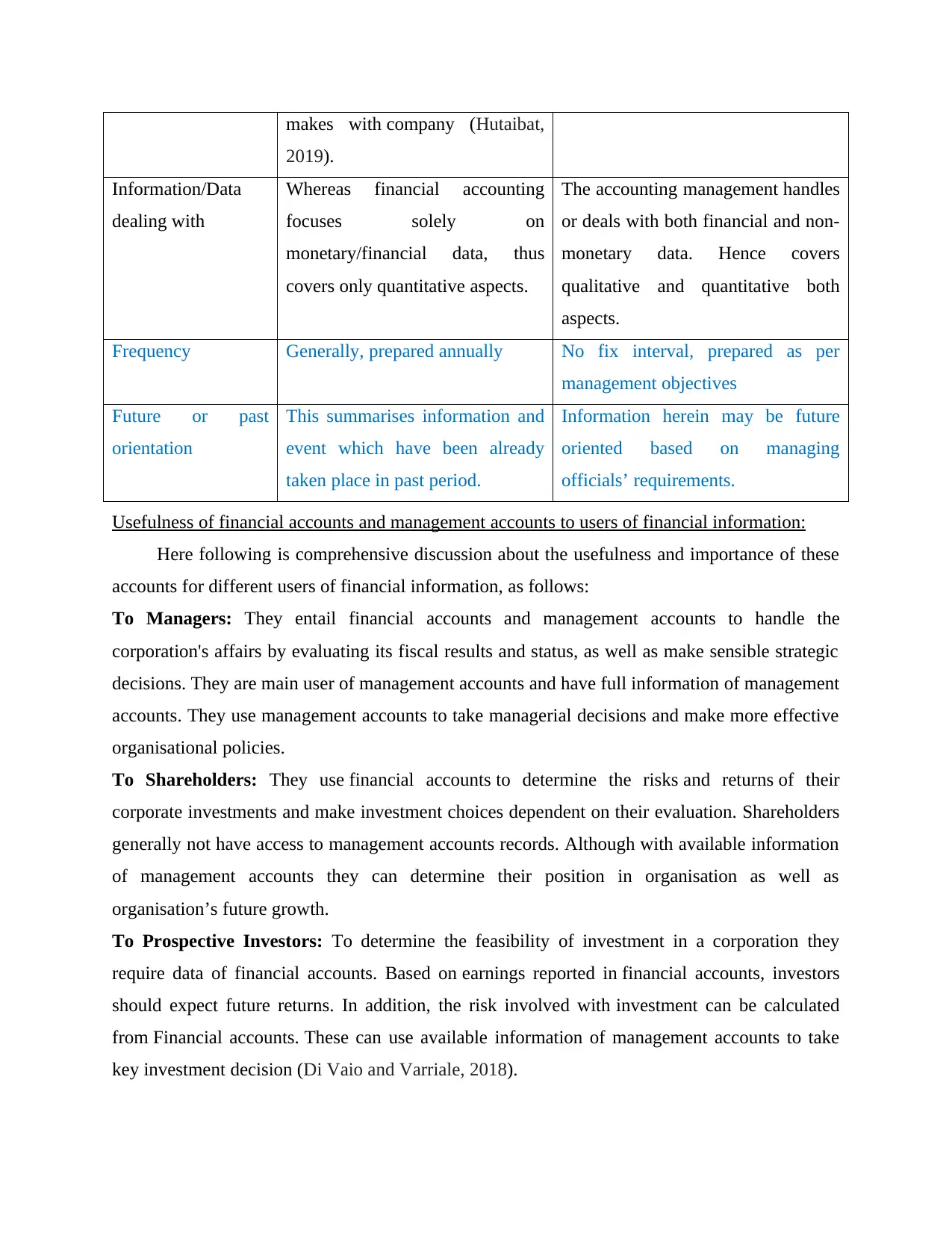
makes with company (Hutaibat,
2019).
Information/Data
dealing with
Whereas financial accounting
focuses solely on
monetary/financial data, thus
covers only quantitative aspects.
The accounting management handles
or deals with both financial and non-
monetary data. Hence covers
qualitative and quantitative both
aspects.
Frequency Generally, prepared annually No fix interval, prepared as per
management objectives
Future or past
orientation
This summarises information and
event which have been already
taken place in past period.
Information herein may be future
oriented based on managing
officials’ requirements.
Usefulness of financial accounts and management accounts to users of financial information:
Here following is comprehensive discussion about the usefulness and importance of these
accounts for different users of financial information, as follows:
To Managers: They entail financial accounts and management accounts to handle the
corporation's affairs by evaluating its fiscal results and status, as well as make sensible strategic
decisions. They are main user of management accounts and have full information of management
accounts. They use management accounts to take managerial decisions and make more effective
organisational policies.
To Shareholders: They use financial accounts to determine the risks and returns of their
corporate investments and make investment choices dependent on their evaluation. Shareholders
generally not have access to management accounts records. Although with available information
of management accounts they can determine their position in organisation as well as
organisation’s future growth.
To Prospective Investors: To determine the feasibility of investment in a corporation they
require data of financial accounts. Based on earnings reported in financial accounts, investors
should expect future returns. In addition, the risk involved with investment can be calculated
from Financial accounts. These can use available information of management accounts to take
key investment decision (Di Vaio and Varriale, 2018).
2019).
Information/Data
dealing with
Whereas financial accounting
focuses solely on
monetary/financial data, thus
covers only quantitative aspects.
The accounting management handles
or deals with both financial and non-
monetary data. Hence covers
qualitative and quantitative both
aspects.
Frequency Generally, prepared annually No fix interval, prepared as per
management objectives
Future or past
orientation
This summarises information and
event which have been already
taken place in past period.
Information herein may be future
oriented based on managing
officials’ requirements.
Usefulness of financial accounts and management accounts to users of financial information:
Here following is comprehensive discussion about the usefulness and importance of these
accounts for different users of financial information, as follows:
To Managers: They entail financial accounts and management accounts to handle the
corporation's affairs by evaluating its fiscal results and status, as well as make sensible strategic
decisions. They are main user of management accounts and have full information of management
accounts. They use management accounts to take managerial decisions and make more effective
organisational policies.
To Shareholders: They use financial accounts to determine the risks and returns of their
corporate investments and make investment choices dependent on their evaluation. Shareholders
generally not have access to management accounts records. Although with available information
of management accounts they can determine their position in organisation as well as
organisation’s future growth.
To Prospective Investors: To determine the feasibility of investment in a corporation they
require data of financial accounts. Based on earnings reported in financial accounts, investors
should expect future returns. In addition, the risk involved with investment can be calculated
from Financial accounts. These can use available information of management accounts to take
key investment decision (Di Vaio and Varriale, 2018).
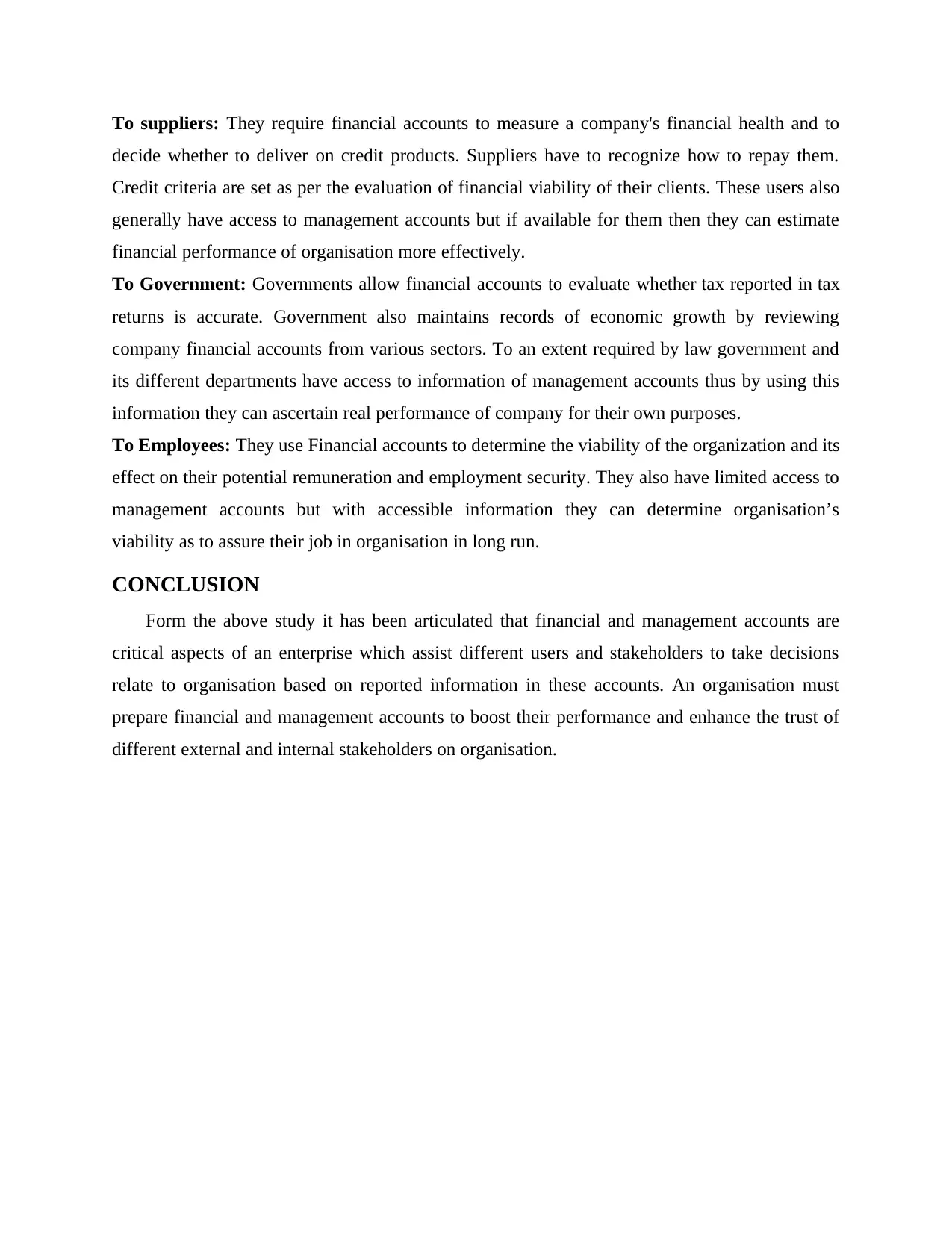
To suppliers: They require financial accounts to measure a company's financial health and to
decide whether to deliver on credit products. Suppliers have to recognize how to repay them.
Credit criteria are set as per the evaluation of financial viability of their clients. These users also
generally have access to management accounts but if available for them then they can estimate
financial performance of organisation more effectively.
To Government: Governments allow financial accounts to evaluate whether tax reported in tax
returns is accurate. Government also maintains records of economic growth by reviewing
company financial accounts from various sectors. To an extent required by law government and
its different departments have access to information of management accounts thus by using this
information they can ascertain real performance of company for their own purposes.
To Employees: They use Financial accounts to determine the viability of the organization and its
effect on their potential remuneration and employment security. They also have limited access to
management accounts but with accessible information they can determine organisation’s
viability as to assure their job in organisation in long run.
CONCLUSION
Form the above study it has been articulated that financial and management accounts are
critical aspects of an enterprise which assist different users and stakeholders to take decisions
relate to organisation based on reported information in these accounts. An organisation must
prepare financial and management accounts to boost their performance and enhance the trust of
different external and internal stakeholders on organisation.
decide whether to deliver on credit products. Suppliers have to recognize how to repay them.
Credit criteria are set as per the evaluation of financial viability of their clients. These users also
generally have access to management accounts but if available for them then they can estimate
financial performance of organisation more effectively.
To Government: Governments allow financial accounts to evaluate whether tax reported in tax
returns is accurate. Government also maintains records of economic growth by reviewing
company financial accounts from various sectors. To an extent required by law government and
its different departments have access to information of management accounts thus by using this
information they can ascertain real performance of company for their own purposes.
To Employees: They use Financial accounts to determine the viability of the organization and its
effect on their potential remuneration and employment security. They also have limited access to
management accounts but with accessible information they can determine organisation’s
viability as to assure their job in organisation in long run.
CONCLUSION
Form the above study it has been articulated that financial and management accounts are
critical aspects of an enterprise which assist different users and stakeholders to take decisions
relate to organisation based on reported information in these accounts. An organisation must
prepare financial and management accounts to boost their performance and enhance the trust of
different external and internal stakeholders on organisation.
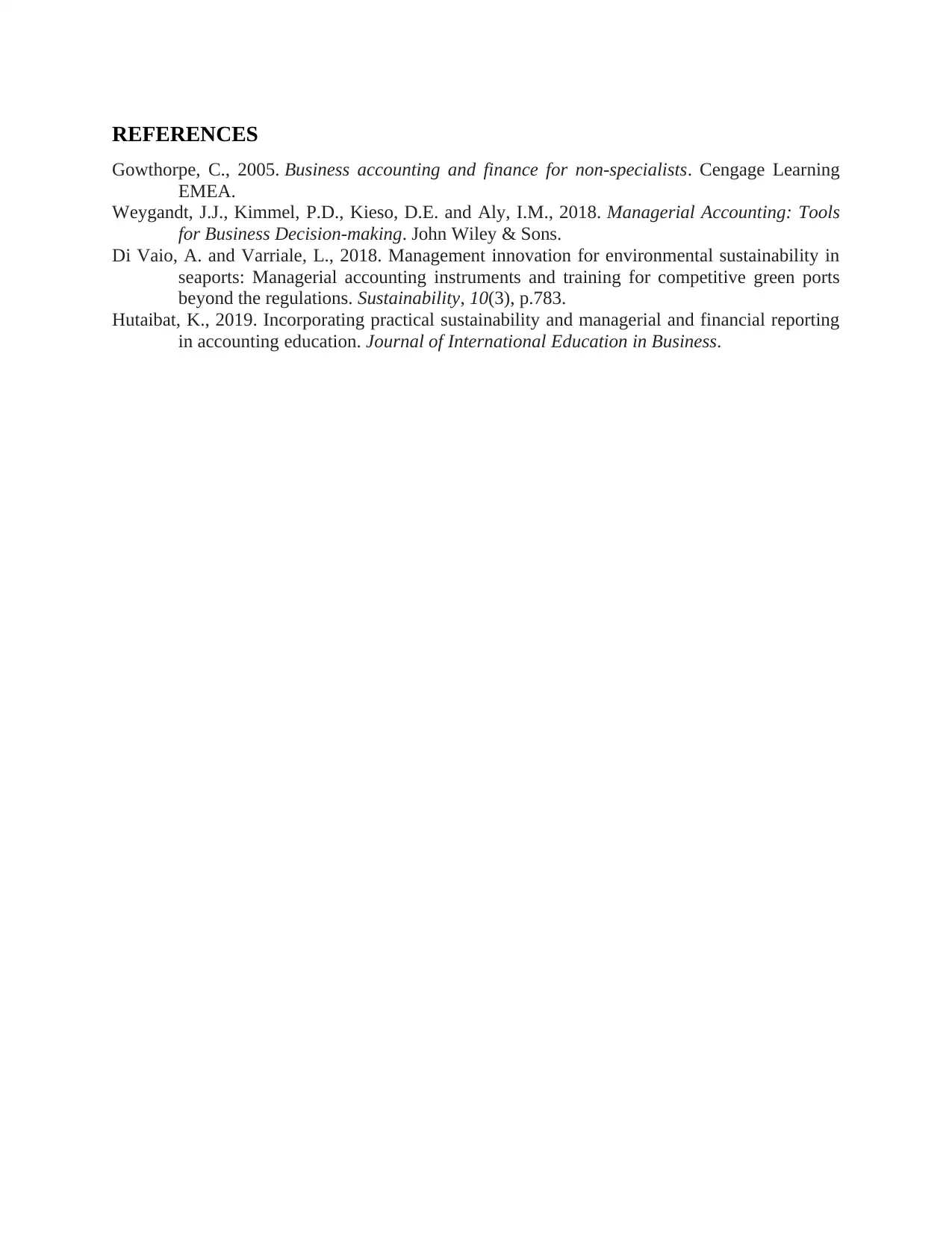
REFERENCES
Gowthorpe, C., 2005. Business accounting and finance for non-specialists. Cengage Learning
EMEA.
Weygandt, J.J., Kimmel, P.D., Kieso, D.E. and Aly, I.M., 2018. Managerial Accounting: Tools
for Business Decision-making. John Wiley & Sons.
Di Vaio, A. and Varriale, L., 2018. Management innovation for environmental sustainability in
seaports: Managerial accounting instruments and training for competitive green ports
beyond the regulations. Sustainability, 10(3), p.783.
Hutaibat, K., 2019. Incorporating practical sustainability and managerial and financial reporting
in accounting education. Journal of International Education in Business.
Gowthorpe, C., 2005. Business accounting and finance for non-specialists. Cengage Learning
EMEA.
Weygandt, J.J., Kimmel, P.D., Kieso, D.E. and Aly, I.M., 2018. Managerial Accounting: Tools
for Business Decision-making. John Wiley & Sons.
Di Vaio, A. and Varriale, L., 2018. Management innovation for environmental sustainability in
seaports: Managerial accounting instruments and training for competitive green ports
beyond the regulations. Sustainability, 10(3), p.783.
Hutaibat, K., 2019. Incorporating practical sustainability and managerial and financial reporting
in accounting education. Journal of International Education in Business.
1 out of 7
Related Documents
Your All-in-One AI-Powered Toolkit for Academic Success.
+13062052269
info@desklib.com
Available 24*7 on WhatsApp / Email
![[object Object]](/_next/static/media/star-bottom.7253800d.svg)
Unlock your academic potential
© 2024 | Zucol Services PVT LTD | All rights reserved.




